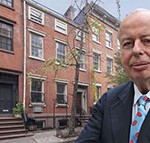“The firm is not ‘sapped’,” the owner of Leslie J. Garfield said in an email responding to language in The Real Deal’s recent story on a top-performing broker jumping to Serhant.
It was the earliest, but not the last, pushback from Jed Garfield on the 50-year-old townhouse-focused firm after losing the co-founder of its top team and four of its 21 agents.
“We are excited to continue to grow the firm and lead the city in townhouse sales as we have for the last 50 years,” Garfield said in a subsequent statement.
Garfield didn’t get specific on next steps after the departures presented a hard-to-ignore question for one of the last independent residential brokerages in New York City.
A broker’s piece of the pie
“It’s great to be a specialist,” broker Ravi Kantha told TRD last year. “That’s how you separate yourself from the broker who’s running around selling $500,000 apartments in Bed Stuy and some houses in Carroll Gardens, and they’ve got a listing on the Upper East Side. That’s a hectic business life to lead.”
The Lesser Kantha Team finished seventh in The Real Deal’s ranking of New York City’s top brokers in 2023 with more than $186 million in on-market, sell-side volume. By comparison, the Leslie J. Garfield notched roughly $265 million in on-market, sell-side volume across Manhattan and Brooklyn.
The brokerage was founded in 1972 by Leslie Garfield, who sold it to his son in 2003.
The firm has stood on its own, even as hallmarks of New York City’s independent brokerage scene like Halstead, Stribling and Warburg Realty have fallen away to acquisitions in recent years.
It’s not for lack of interest: According to a source familiar with the matter, Compass previously inquired about buying the firm but discussions didn’t proceed beyond the preliminary stages.
The firm punches beyond its headcount, thanks to its institutional knowledge and established niche among the city’s ritzy townhouses.
It’s this commitment to its specialty that both provides its value and sparks questions around how it might make up for potential changes in business after the agent exits.
The firm doesn’t appear to have plans for any splashy agent acquisitions. With its comparatively limited resources for perks like agent support, it doesn’t have a track record of poaching big-name brokers from other firms.
Garfield insisted the brokerage will maintain its office in Brooklyn Heights, a premier neighborhood for luxury townhouses where the firm’s digs appeared empty and dark on a recent afternoon, adjacent to a brightly-lit Compass office.
When news of Kantha’s move broke, the firm was “already in the process of filling the void,” according to Matthew Lesser, a top-producing broker who was Kantha’s team co-founder and partner of six years.
Lesser, who is remaining with the firm, has reinforced Garfield’s party line that the brokerage is proceeding with business as usual and staying in its lane.
“We’re not trying to be all things for all people,” Lesser told TRD last year.
Read more



